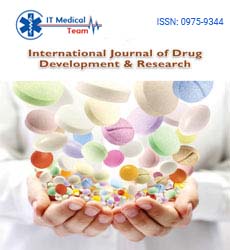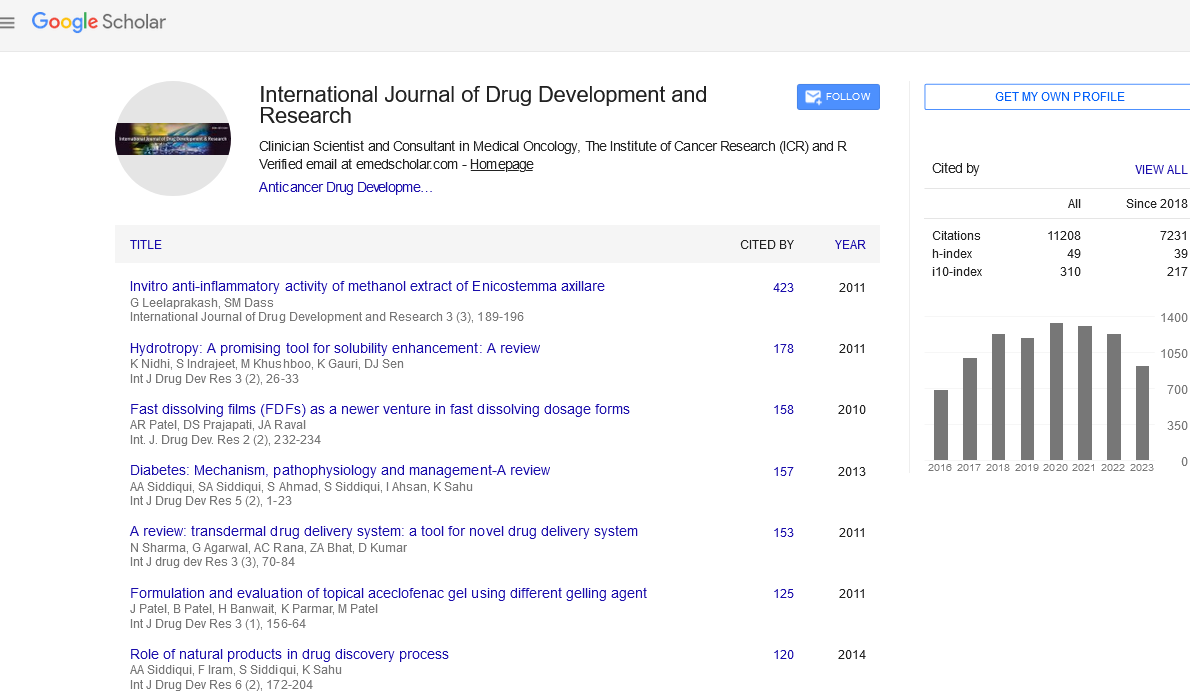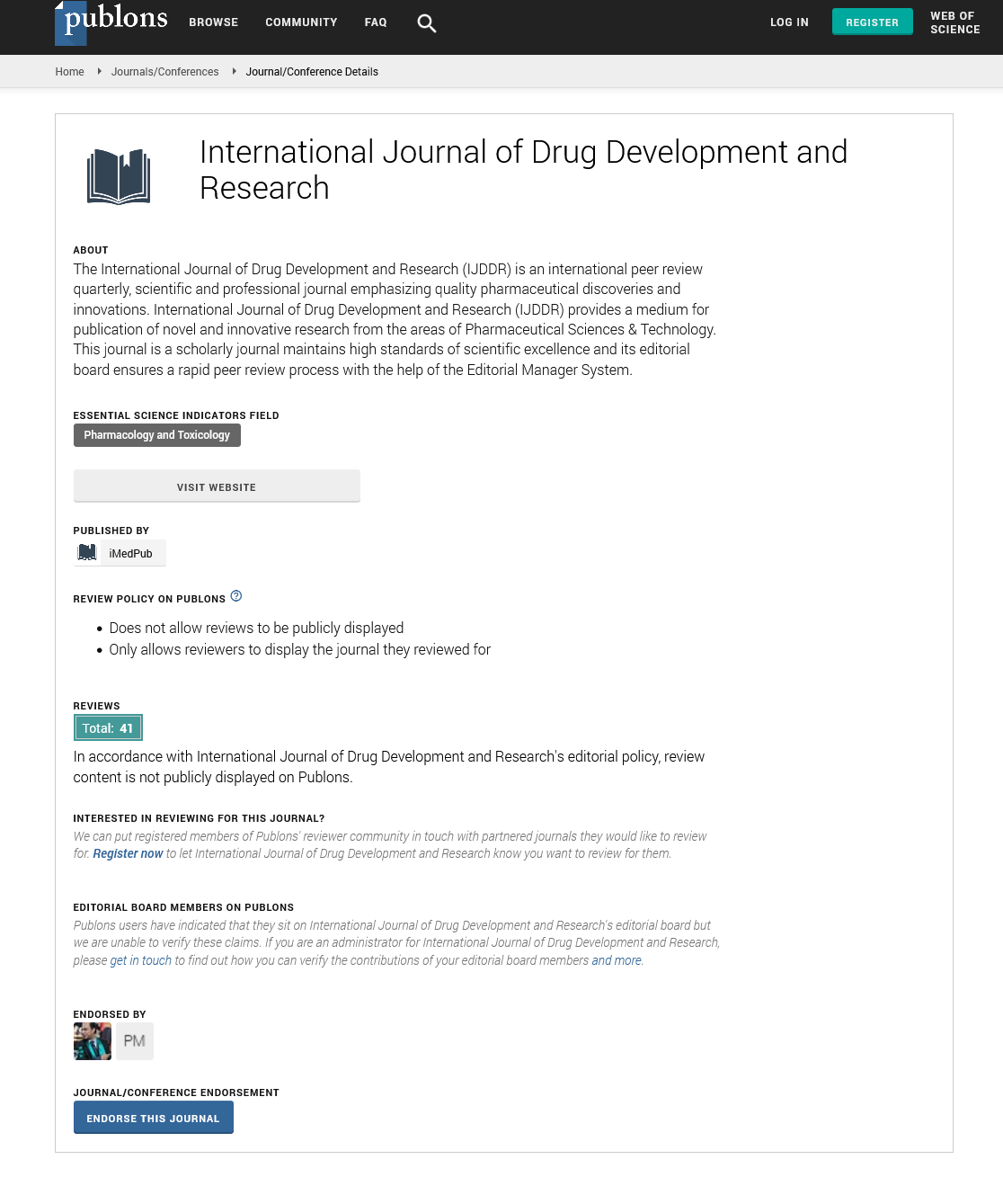Perspective - (2024) Volume 16, Issue 4
Innovation in Pharmaceutical R&D: Navigating the Evolving Research Landscape
Deeksha Tiwari*
Department of Pharmacy, University of Pune, Pune, India
*Correspondence:
Deeksha Tiwari, Department of Pharmacy, University of Pune, Pune,
India,
Email:
Received: 08-Jul-2024, Manuscript No. IJDDR-24-15042;
Editor assigned: 10-Jul-2024, Pre QC No. IJDDR-24-15042 (PQ);
Reviewed: 24-Jul-2024, QC No. IJDDR-24-15042;
Revised: 31-Jul-2024, Manuscript No. IJDDR-24-15042 (R);
Published:
07-Aug-2024
Introduction
The field of pharmaceutical Research and Development (R
and D) is at a pivotal juncture in 2024, characterized by rapid
technological advancements, evolving regulatory landscapes,
and increasing demands for novel therapies to address unmet
medical needs. This article explores the current state of
innovation in pharmaceutical R and D, highlighting key trends,
challenges, and future prospects shaping the industry.
Description
Current trends in pharmaceutical R and D
Biopharmaceutical advancements: Biopharmaceuticals, including
monoclonal antibodies, recombinant proteins, and gene
therapies, continue to dominate the innovation landscape. These
advanced therapies offer targeted treatment options with
potentially fewer side effects compared to traditional small
molecule drugs. The rise of biologics reflects a shift towards
personalized medicine and precision therapies tailored to
individual patient profiles.
Digital transformation: The integration of digital technologies
such as Artificial Intelligence (AI), machine learning, and big data
analytics is revolutionizing pharmaceutical R and D. AI-powered
algorithms expedite drug discovery processes by predicting
molecular interactions, optimizing drug candidates, and
analyzing vast datasets for biomarker identification and patient
stratification in clinical trials. Digital tools also enhance real-time
monitoring of patient outcomes and adherence, thereby
improving overall healthcare delivery.
Precision medicine: Advancements in genomics, proteomics,
and biomarker research are driving the adoption of precision
medicine approaches. By identifying genetic variations and
molecular signatures associated with disease susceptibility and
progression, researchers can develop targeted therapies that
maximize efficacy and minimize adverse effects based on
individual patient characteristics.
Collaborative initiatives: Public-private partnerships, academic-industry
collaborations, and consortia are fostering innovation by
pooling resources, expertise, and data. These collaborations
accelerate research timelines, facilitate knowledge sharing, and
mitigate financial risks associated with drug development,
particularly for complex diseases with multifactorial etiologies.
Challenges in pharmaceutical R and D
Rising development costs: The cost of bringing a new drug to
market continues to escalate, driven by stringent regulatory
requirements, lengthy clinical trial timelines, and the complexities
of biological drug development. Pharmaceutical companies face
significant financial pressures to demonstrate the cost-effectiveness
and clinical superiority of new therapies amidst a
competitive market landscape.
Regulatory hurdles: Navigating global regulatory frameworks,
including stringent safety and efficacy standards, poses
challenges for drug developers. Regulatory agencies require
robust evidence of clinical benefit, long-term safety profiles, and
pharmacoeconomic analyses to support market approval,
necessitating meticulous planning and adherence to regulatory
guidelines throughout the drug development lifecycle.
Complexity of disease targets: Many diseases, particularly
neurodegenerative disorders, rare diseases, and cancers, present
complex pathophysiological mechanisms that defy conventional
therapeutic approaches. Identifying validated drug targets,
understanding disease heterogeneity, and overcoming biological
barriers (e.g., blood-brain barrier) remain formidable challenges
in drug discovery and development.
Ethical and legal considerations
The ethical implications of pharmaceutical R and D, including
patient privacy, informed consent, and equitable access to
innovative therapies, are increasingly scrutinized. Stakeholders
must navigate ethical dilemmas surrounding clinical trial conduct,
data sharing, and the commercialization of breakthrough
treatments to uphold ethical standards and societal expectations.
Future directions in pharmaceutical R and D
Emerging therapeutic modalities: The advent of novel
therapeutic modalities, such as RNA-based therapies (e.g., mRNA
vaccines), cell and gene therapies, and microbiome-targeted
interventions, holds promise for addressing previously untreatable diseases. These innovative approaches leverage cutting-edge
technologies to modulate disease pathways at a molecular level
and offer potential cures rather than symptomatic relief.
Patient-centric innovation: A shift towards patient-centric R
and D models emphasizes the incorporation of patient
perspectives, preferences, and real-world data into drug
development strategies. Enhanced patient engagement, digital
health technologies, and decentralized clinical trial designs aim
to optimize clinical outcomes, improve treatment adherence,
and empower patients in managing their health.
Global health initiatives: Global collaborations and initiatives
are prioritizing the development of affordable, accessible
therapies for neglected tropical diseases, antimicrobial resistance,
and global health emergencies (e.g., COVID-19 pandemic).
Multilateral efforts promote equitable vaccine distribution,
technology transfer, and capacity building in low and middle
income countries to address global health disparities.
Innovative financing models: Alternative financing mechanisms,
including venture philanthropy, social impact investing, and pay-for-performance agreements, are reshaping funding strategies
for high-risk, high-reward drug development projects. These
models incentivize innovation, mitigate financial risks, and
ensure sustainable access to innovative therapies for patients
worldwide.
Conclusion
In conclusion, pharmaceutical R and D is undergoing a
transformative evolution driven by technological innovation,
collaborative partnerships, and a renewed focus on patient
centered healthcare solutions. Despite existing challenges, the
industry's resilience and commitment to scientific advancement
promise to unlock new frontiers in drug discovery, personalized
medicine, and global health equity. By embracing emerging
technologies, leveraging interdisciplinary expertise, and
prioritizing ethical principles, stakeholders can collectively shape
a future where innovative therapies translate into tangible
improvements in patient outcomes and public health outcomes
globally.
Citation: Tiwari D (2024) Innovation in Pharmaceutical R and D: Navigating the Evolving Research Landscape. Int J Drug Dev Res Vol:16 No:4






